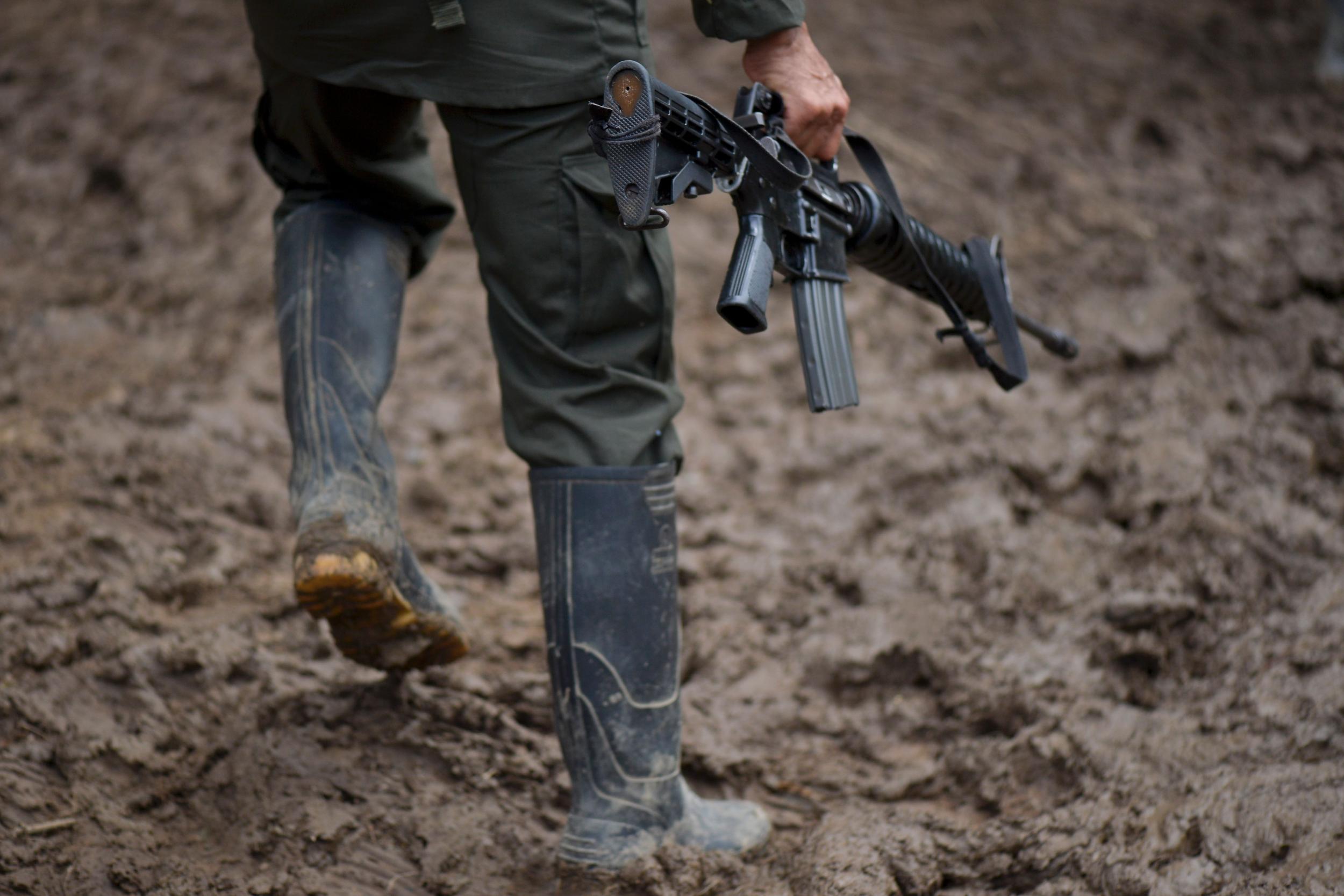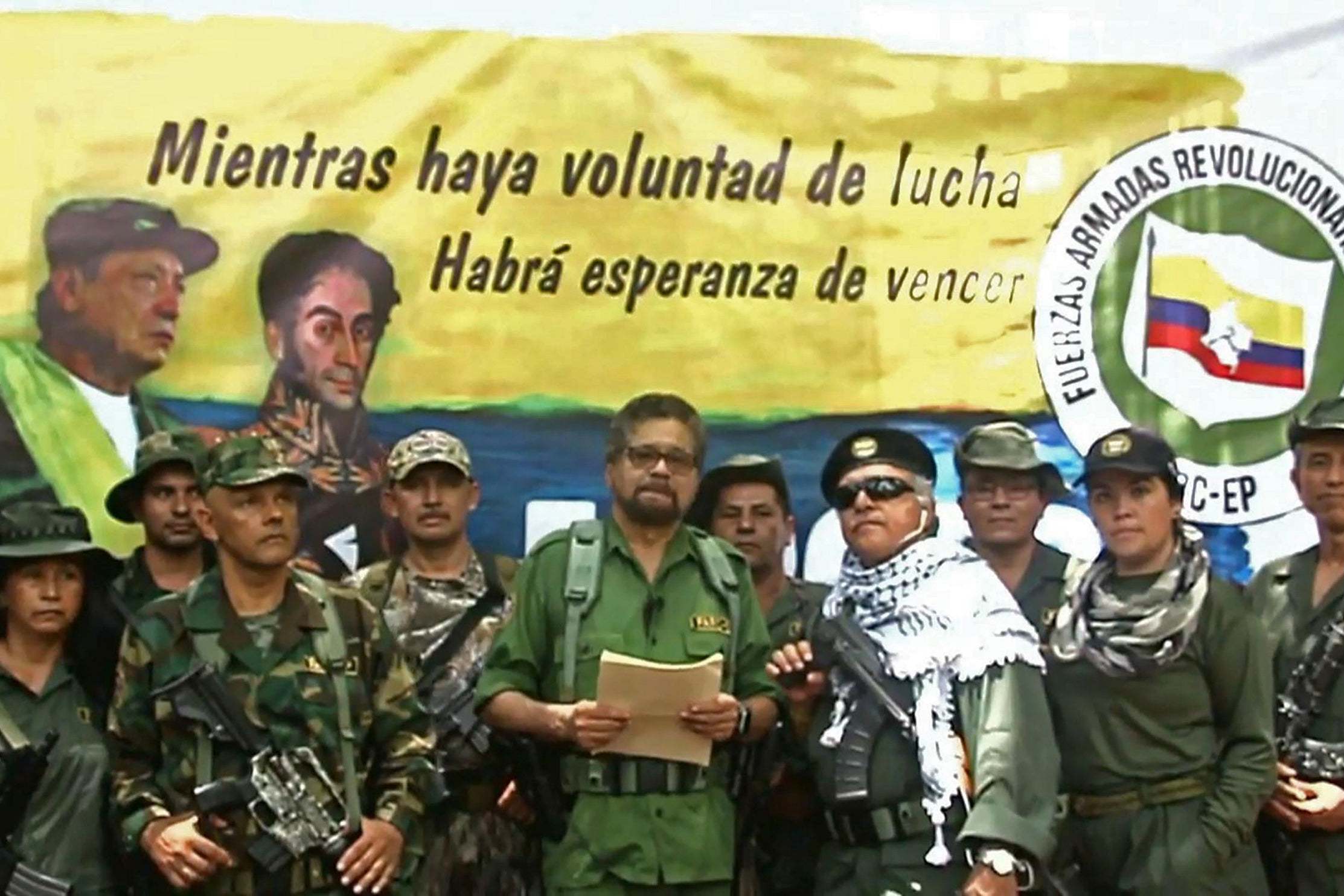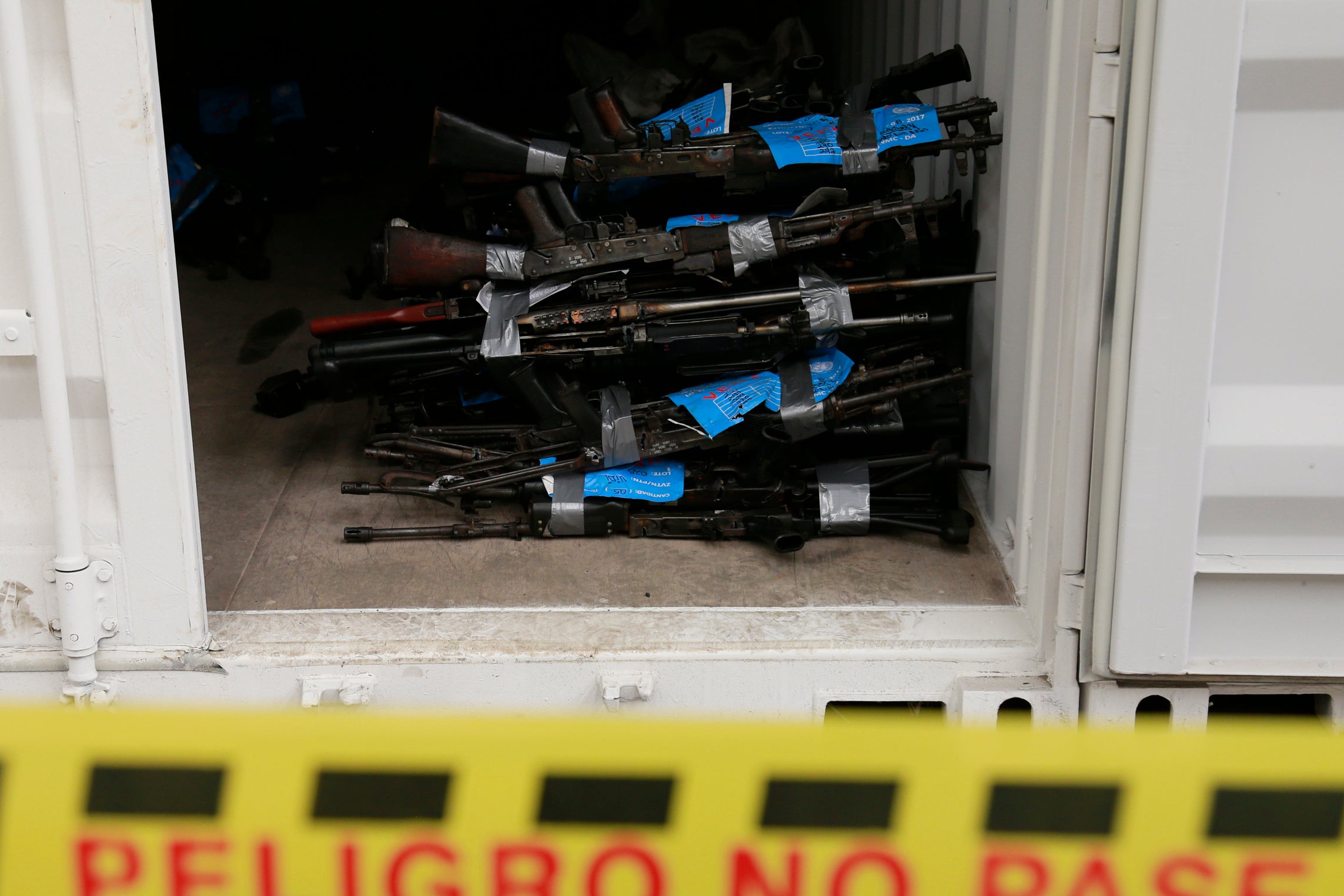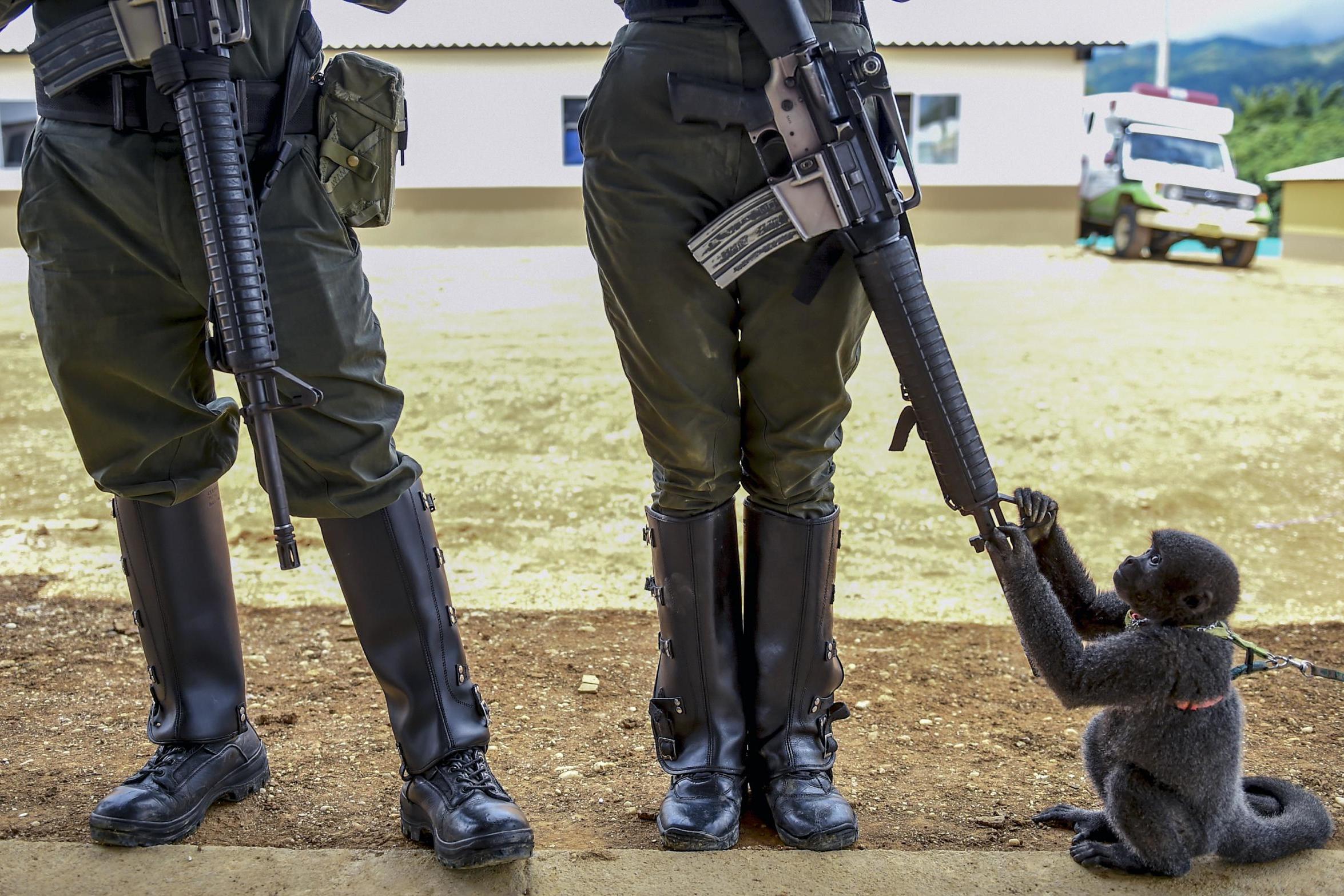FARC rebels are calling for a new war. Does this spell the end of Colombia’s peace process?
Critics of the deal saw the images of the rebel leaders once again in arms as vindicating what they feared all along: the criminals would never be able to abandon their old ways, writes Luke Taylor

Your support helps us to tell the story
From reproductive rights to climate change to Big Tech, The Independent is on the ground when the story is developing. Whether it's investigating the financials of Elon Musk's pro-Trump PAC or producing our latest documentary, 'The A Word', which shines a light on the American women fighting for reproductive rights, we know how important it is to parse out the facts from the messaging.
At such a critical moment in US history, we need reporters on the ground. Your donation allows us to keep sending journalists to speak to both sides of the story.
The Independent is trusted by Americans across the entire political spectrum. And unlike many other quality news outlets, we choose not to lock Americans out of our reporting and analysis with paywalls. We believe quality journalism should be available to everyone, paid for by those who can afford it.
Your support makes all the difference.Colombians awoke to two familiar faces on their TV screens on Thursday morning – those of Ivan Marquez and Jesus Santrich, former leaders of the now-demobilised guerrilla group, the Revolutionary Armed Forces of Colombia (Farc).
But this time it was different. They were calling for a new war in Colombia.
In 2016, the pair made regular appearances on television screens across the country – and the world – dressed in white shirts, symbolic of the historic peace accord they had finally reached with the government after four years of internationally mediated negotiations in Havana. Mr Marquez had led Farc’s negotiating team with Mr Santrich also at the table.
Now, just three years on, they were dressed in green coveralls and armed with automatic rifles in what appeared to be a new jungle camp somewhere in the Amazon rainforest.
The country’s peace process has already faced significant setbacks and is fiercely opposed by many, but the declaration is perhaps its biggest test yet.
Analysts say it could go one of two ways: provide a much-needed strengthening of a fragile peace process, or jeopardise it, sending the country hurtling back towards war.

In the video, Mr Marquez, flanked by 20 armed men, snapped back into his former Marxist rhetoric as if he had never flirted with civilian life.
“This is the continuation of the rebel fight in answer to the betrayal of the state of the Havana peace accords,” he said in a 32-minute video in which he blamed the government for not having kept its end of the peace deal.
“We were never beaten or defeated ideologically, so the struggle continues.”
The deal was internationally lauded for formally ending a 52-year war which killed over 260,000 and displaced 7 million as the Farc, paramilitaries and the national army fought each other bitterly for control of territory.
But the agreement has been fraught with setbacks.
Social leaders voicing their support of the accord are being killed at a shocking rate – 627 seven local activists since the deal was signed, according to local NGO Indepaz.
The pledges the government made to develop neglected regions of the country remain little more than pledges, encouraging dissident rebels to abandon the process and return to warfare.
Dissidents now number around 2,300, according to leaked military documents.

Mr Marquez’s statement is viewed by supporters of the accord as emblematic of the failings of Ivan Duque’s government, which was elected on a peace deal-sceptic platform and set out to modify parts of it, such as judicial sentences for ex-rebels that it deems too lenient.
“Again and again, we told the government that its permanent attacks on the peace process and the risk to legal stability that come with it, could push commanders to make wrong decision,” read a statement issued by Sergio Jaramillo and Humberto de la Calle, former officials who had negotiated the deal on behalf of the government.
Us ex-combatants, the fathers, mothers, and children who inhabit this space of 315 inhabitants… here we are, and here we will stay
But critics saw the image of Marquez and Santrich once again in arms as vindicating what they feared all along: the criminals would never be able to abandon their old ways.
“This was predictable,” tweeted Alvaro Uribe, former president, fierce critic of the peace accord, and mentor of President Duque.
“The country has to be aware that there was no peace process, but a pardon for some of those responsible for heinous crimes at a high institutional cost,” he added.
In announcing a return to war, Mr Marquez offered some concessions: they would no longer carry out kidnappings for lucrative ransoms or attack soldiers or police officers who were “respectful to popular interests”.
He did, however, claim that plans were under way to collaborate with the National Liberation Army (ELN) – the second largest guerrilla insurgency after the Farc – which has grown in recent years owing to the power vacuum left by the Farc and a safe haven in neighbouring Venezuela.
In January, the Colombian government said the ELN was responsible for the capital’s worst terrorist attack in decades when a car bomb killed 22 at a police station.
Although not a “death blow” to the peace process, the call to war could weaken it by giving its opponents “a new line of attack”, Adam Isacson, of human rights group The Washington Office on Latin America, told The Independent.
If the call accelerates the process of ex-guerrillas losing faith in a faltering peace deal and sees them return to arms, Colombia could be faced with “a major security problem”, he added.
Ex-Farc guerrillas at a zone dedicated to reincorporating former combatants into civilian life told The Independent that the announcement caused “worry” over a return to war, but crucially, they said they had no plans to renege on their pledges.
“Us ex-combatants – the fathers, mothers, and children who inhabit this space of 315 inhabitants … here we are, and here we will stay,” said Alexander Parra, representative of the Mariana Paez reincorporation zone in the Meta region.
Some 7,000 rebels put down their guns as part of the accord as the Farc transitioned from communist insurgency to peaceful political party.
Rodrigo Londono, alias Timochenko, and Farc’s leader, distanced the party from the new rebels and played down their significance.
But alluding to a welcome clarity of those who had chosen the path of legality and those who had not, he said: “It’s an unfortunate development, but at the same time it leaves things clearer and ends the ambiguity because we had been facing a complex situation for some time.”

The robust response from the public and key political figures denouncing the development may have counterintuitively reinforced the peace process, said Sergio Guzman, director of Colombia Risk Analysis consultants.
“[Thanks to] the amount of people supporting the government and keeping its commitment to the agreement and demobilised individuals, including Timochenko, peace is stronger as a result of what happened today,” he said.
But the real impact will become clear in the coming days as the government decides its next move – and others are not so optimistic.
An animated President Duque, speaking from the presidential palace, pledged to impose the “full weight of the law” on the new “narco-terrorist gang”. He wants to create a new unit dedicated to pursuing them, and offered a reward of £725,000 for the head of each commander who appeared in the video.
But although Duque reiterated support for the peace process, the majority of his party would like to see it torn up.
This gifts them an opportune moment to return the country to war, said Sandra Borda, political analyst and associate professor at Los Andes University in Bogotá.
“This could be a strong wake-up call to the government… does it want its main achievement to be having ended the prospect of peace?” she said.
“If they don’t commit to it, if they don’t realise the best response is committing to peace process, the potential that this becomes the beginning another conflict is very high.’’
She added: “I am not optimistic at all.”
Join our commenting forum
Join thought-provoking conversations, follow other Independent readers and see their replies
Comments